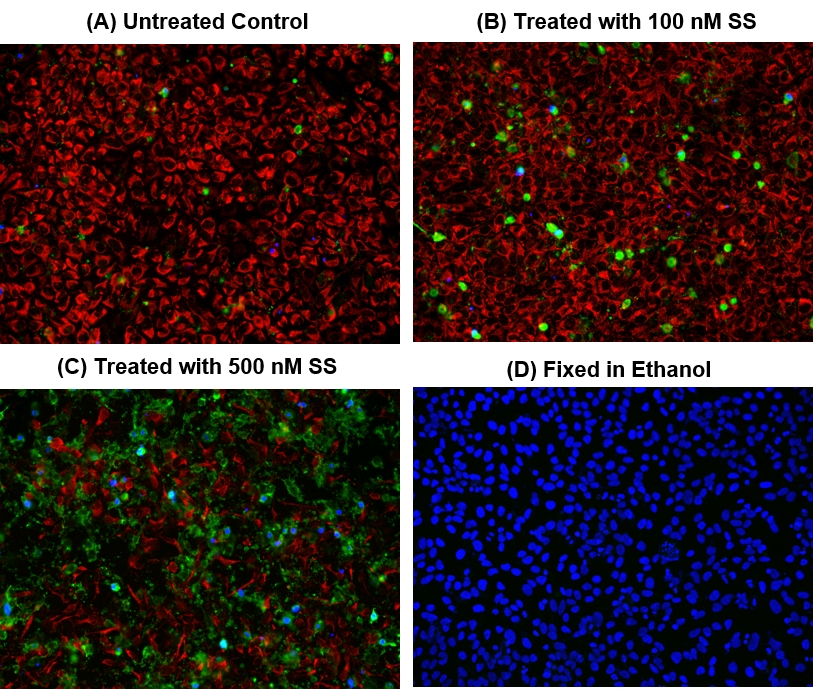上海金畔生物科技有限公司代理AAT Bioquest荧光染料全线产品,欢迎访问AAT Bioquest荧光染料官网了解更多信息。
Cell Meter 细胞凋亡和细胞坏死检测试剂盒 三色荧光
 |
货号 | 22846 | 存储条件 | 在零下15度以下保存, 避免光照 |
| 规格 | 200 Tests | 价格 | 6564 | |
| Ex (nm) | Em (nm) | |||
| 分子量 | 溶剂 | |||
| 产品详细介绍 | ||||
简要概述
我们的Cell Meter 检测试剂盒是一套用于检测细胞生存力的工具,可以使用多种参数。该特定试剂盒旨在同时检测凋亡,坏死和健康细胞。细胞凋亡是一种主动的程序化的细胞自发解体过程,可避免引起炎症。在凋亡中,磷脂酰丝氨酸(PS)被转移到质膜的外部小叶。作为细胞凋亡初始/中间阶段的通用指标,在观察形态变化之前,可以检测到磷脂酰丝氨酸在细胞表面的出现。 PS指示剂Annexin V-iFluor 488共轭物与膜PS结合后具有绿色荧光。膜不透性的Nuclear Blue DCS1(Ex / Em = 350/461 nm)标记细胞核的能力证明,质膜完整性的丧失代表了显示凋亡和坏死晚期的直接方法。此外,该试剂盒还提供了活细胞标记染料Cellbrite Red(Ex / Em = 613/631 nm),用于标记非凋亡健康细胞。该试剂盒经过优化,可通过荧光显微镜同时检测细胞凋亡(绿色),坏死(蓝色和/或绿色)和健康细胞(红色)。金畔生物是AAT Bioquest的中国代理商,为您提供最优质的Cell Meter 细胞凋亡和细胞坏死检测试剂盒。
适用仪器
| 荧光显微镜 | |
| 激发: | 494 nm (凋亡) / 350 nm (坏死) / 613 nm (活) |
| 发射: | 520 nm (凋亡) / 461 nm (坏死) / 631 nm (活) |
| 推荐孔板: | 黑色透明 |
| 通道: | FITC滤波片 (凋亡) / DAPI滤波片(坏死) / Cy5滤波片 (活) |
产品说明书
样品实验方案
简要概述
- 用测试化合物准备细胞
- 加入三重荧光工作溶液(100 µL /样品)
- 在室温或37℃下孵育30-60分钟
- 用荧光显微镜在FITC通道(凋亡),DAPI通道(坏死)或Texas Red / Cy5通道(健康细胞)处进行分析
溶液配制
工作溶液配制
将10 µL的100X Annexin V-iFluor 488偶联物(组分A),5 µL的200X Nuclear Blue DCS1(组分C)和5 µL的200X Cellbrite Red(组分D)添加到1 mL的测定缓冲液(组分B)中 )。 三重荧光测定溶液在室温下稳定至少1小时。 注意:由于最佳染色条件可能会因细胞类型而异,因此建议分别确定组分A,C和D的适当浓度。
实验步骤
1.处理后除去细胞培养基并检测化合物。
2.加入100 µL /孔(96孔板)或50 µL /孔(384孔板)的三重荧光分析溶液。 在避光条件下,于37℃孵育30至60分钟。
3.用HBSS,PBS或自备缓冲液洗涤细胞两次。
4.在带有FITC滤光片的荧光显微镜下,用Annexin V-iFluor 488偶联物分析凋亡细胞。 质膜上的绿色染色(Ex / Em = 494/520 nm)表明膜联蛋白V-iFluor 488缀合物与细胞表面的PS结合。 使用荧光显微镜用DAPI滤光片(Ex / Em = 350/461 nm)检测坏死的荧光强度,使用Texas Red或Cy5滤光片(Ex / Em = 613/631 nm)检测活细胞的荧光强度。
参考文献
Anthocyanin-rich blackcurrant extract inhibits proliferation of the MCF10A healthy human breast epithelial cell line through induction of G0/G1 arrest and apoptosis
Authors: Nanashima, Naoki and Horie, Kayo and Chiba, Mitsuru and Nakano, Manabu and Maeda, Hayato and Nakamura, Toshiya
Journal: Molecular Medicine Reports (2017): 6134–6141
Clusterin signals via ApoER2/VLDLR and induces meiosis of male germ cells
Authors: Riaz, Muhammad Assad and Stammler, Angelika and Borgers, Mareike and Konrad, Lutz
Journal: American Journal of Translational Research (2017): 1266
Detecting Apoptosis, Autophagy, and Necrosis
Authors: Coleman, Jack and Liu, Rui and Wang, Kathy and Kumar, Arun
Journal: Apoptosis Methods in Toxicology (2016): 77–92
A pharmaceutical preparation of Salvia miltiorrhiza protects cardiac myocytes from tumor necrosis factor-induced apoptosis and reduces angiotensin II-stimulated collagen synthesis in fibroblasts
Authors: Ling S, Luo R, Dai A, Guo Z, Guo R, Komesaroff PA.
Journal: Phytomedicine (2009): 56
Agmatine protects cultured retinal ganglion cells from tumor necrosis factor-alpha-induced apoptosis
Authors: Hong S, Kim CY, Lee JE, Seong GJ.
Journal: Life Sci (2009): 28
Concurrent induction of necrosis, apoptosis, and autophagy in ischemic preconditioned human livers formerly treated by chemotherapy
Authors: Domart MC, Esposti DD, Sebagh M, Olaya N, Harper F, Pierron G, Franc B, Tanabe KK, Debuire B, Azoulay D, Brenner C, Lemoine A.
Journal: J Hepatol (2009): 881
Down-regulation of myeloid cell leukemia 1 by epigallocatechin-3-gallate sensitizes rheumatoid arthritis synovial fibroblasts to tumor necrosis factor alpha-induced apoptosis
Authors: Ahmed S, Silverman MD, Marotte H, Kwan K, Matuszczak N, Koch AE.
Journal: Arthritis Rheum (2009): 1282
Exaggerated up-regulation of tumor necrosis factor alpha-dependent apoptosis in the older mouse liver following reperfusion injury: targeting liver protective strategies to patient age
Authors: Selzner M, Selzner N, Chen L, Borozan I, Sun J, Xue-Zhong M, Zhang J, McGilvray ID.
Journal: Liver Transpl (2009): 1594
Increased apoptosis in HepG2.2.15 cells with hepatitis B virus expression by synergistic induction of interferon-gamma and tumour necrosis factor-alpha
Authors: Shi H, Guan SH.
Journal: Liver Int (2009): 349
Outside-to-inside signaling through transmembrane tumor necrosis factor reverses pathologic interleukin-1beta production and deficient apoptosis of rheumatoid arthritis monocytes
Authors: Meusch U, Rossol M, Baerwald C, Hauschildt S, Wagner U.
Journal: Arthritis Rheum (2009): 2612
